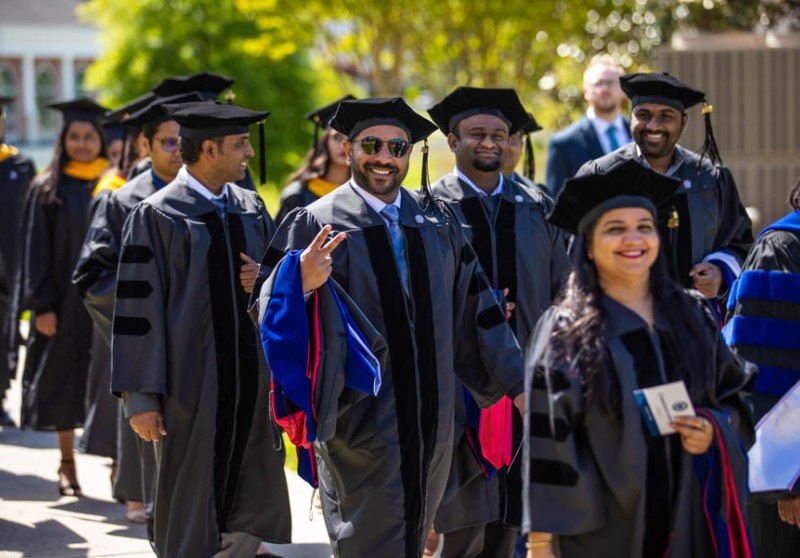Data is only useful to those who can interpret it. Become the best interpreter.
Advance your career with the Executive Master of Science in Data Science from University of the Cumberlands. This program equips you with the advanced skills in statistics, computer science, and data integration needed to thrive in today’s data-driven economy. With demand for data professionals growing across industries, the executive data science master’s program prepares you for leadership roles where you can apply analytics and innovation to solve complex business and organizational challenges.
The curriculum blends theory and application in key areas such as statistics, mathematics, business analytics, data integration, visualization, and communication. Designed for working professionals, this hybrid executive master’s in data science offers flexibility while providing the advanced knowledge employers value. By completing this degree, you’ll position yourself as a highly qualified data science professional ready to compete for opportunities across Kentucky, the United States, and global markets.
By the Numbers
Programs & Requirements
Executive Master's in Data Science
Intended for those who have earned a bachelor’s degree and are working in the data science field, this executive master’s degree in data science will help you boost your credentials and accomplish your professional goals. This program can be completed in as little as one year (3 semesters).
UC’s Executive Master's in Science in Data Science executive degree program will prepare you to:
- Format data for analysis
- Determine the algorithm used for the analysis
- Process the data
- Create a plan of action based on the analysis
- Present the results in an easy-to-understand format
Curriculum for the executive master’s in data science will engage you in theories, strategies, and tactics for critical fields, including statistics, mathematics, business, information science and visualization, data integration, graphic design, and communication.
The 31-credit Master of Science in Data Science program requires 27 credit hours in core subjects such as Statistics for Data Science, Deep Learning, and Natural Language Processing and four credit hours for both theory and practicum Capstone courses. You will select a topic of interest for your project, collect data and prepare data sets, and use data processing models to report business results and insights. Alternatively, you could pursue an applied learning practicum or internship.
Course Requirements
- MSDS 530 - Fundamentals of Data Science
- MSDS 531 - Statistics for Data Science
- MSDS 532 - Data Science Programming with Python
- MSDS 533 - Data Management for Data Science
- MSDS 534 - Deep Learning
- MSDS 535 - Data Mining
- MSDS 630 - Natural Language Processing
- MSDS 631 - R Programming
- MSDS 632 - Big Data
- MSDS 690 - Data Science Capstone: Theory (2 cr. hrs.)
- MSDS 699 - Data Science Capstone: Practicum (2 cr. hrs.) or INTR 599 Applied Learning Practicum
*All online students who are seeking to earn this degree must take this course in lieu of INTR 599, in addition to meeting all program degree requirements. Executive format students can substitute the required INTR 599 course in lieu of MSDS 699 as part of their program degree requirements.
** Executive format programs have an applied learning component (internship or practicum) that is an integral and essential part of the established curriculum. Due to the applied learning component required for the degree program, Executive format students must enroll in INTR every term of enrollment.

Executive Student Resources
UC's Department of International Graduate Services enjoys providing support resources for our international students. Find tutorials and information regarding offices and policies for the International Graduate Students and programs.
Executive Program Format
Our Executive Programs include hybrid course days designed for international graduate students studying in the U.S., or domestic students seeking a hybrid-format program. We strive to incorporate professional experience and real-world application of course curriculum into our programs to enhance the learning experience. Practical Training is an integral part of program coursework and available to all students. At the University of the Cumberlands our degree programs focus on quality education at an affordable price.
Executive Program students take three (3) courses per semester. The program semester is based on the existing UC semester calendar, with three (3) annual semesters: fall, spring, and summer. Two of the courses each semester focus on the specific program content. Additionally, students will be required to attend an intensive residency weekend as part of their course enrollment each term. The third class includes an Applied Learning Practicum, in which students apply what they are learning in their other two courses to the real world via work or internship experiences.
Residency FAQs
Residency Session dates are determined by the course that you are registered for. It is very important that you make note of the class you registered for, as well as the designated residency weekend for that course as each course will only meet one weekend for the duration of the semester.
Even though we will only be meeting one weekend per semester, we will have the same number of contact hours with you. This will enable the instructors to make residency weekends much more valuable. This change will allow us to have meaningful projects on residency weekends.
You can view your semester schedule in your self-service portal in your Student Profile. Once you log into your MyUC account, click on Academics, then click on Current Schedule. Your schedule details will indicate the date and location of your residency weekend.
You can find information on the residency site locations on our website.
Yes, all three days are mandatory, and requests to arrive late or leave early will not be approved. Should you not be in attendance for the full session, you will be counted absent for the entire session. Please plan travel accordingly!
Attendance to each executive residency class session is mandatory. Students may make up no more than one (1) residency session throughout the duration of their academic program. Missing a second residency will result in the student being dismissed from the university.
A missed session will result in the student attending a make-up session, and paying a $300 residency make-up fee. In addition, the student may be asked for documentation from the program department providing an explanation as to why the scheduled residency session was missed. Make-up sessions must be completed prior to the end of the term. Noncompliance with this policy will result in dismissal from the executive program.
Make-up residency sessions will be held at our campus in Williamsburg, KY. You will be contacted with the time and dates after your absence is reported. There will only be one (1) residency make-up session offered each semester. Failure to attend all days of the makeup session will result in receiving a failing grade for the course, as well as potential dismissal from the University, and SEVIS termination.
If you cannot be in attendance for all three days then you will be counted absent for the entire residency weekend and be required to attend the make-up residency and pay the $300 make-up fee.
The Department of International Graduate Services will contact you via your UC student email as registration for the next term approaches. Please remember that you are required to register for (one) main class, (one) online class, and Applied Learning Practicum each semester in order to maintain your F1 status – late registration will not be accepted and can result in the termination of your student status.
Once you register for a class you will want to make note of the residency weekend that your class is scheduled, as that is the only session for that class that will be scheduled for the semester. You will need to be sure to plan your travel accordingly to ensure that you are in attendance for the full residency session.
Registration is done on a first-come, first-serve basis. Once a course is full, there will not be additional seats added, as we cannot exceed classroom seating capacity; therefore, it is advised that you register for classes as much in advance as possible. As a reminder, students cannot register for future semesters until their current tuition balance is paid in full.
*Please note all times are in local time zone*
Friday
Facility will open at 4:00 p.m.
Saturday
Facility will open at 7:00 a.m.
Sunday
Facility will open at 7:00 a.m.
We ask that you please take note of the above-mentioned times and schedule your travel accordingly.
*These dates have been set; however, if any changes are made, they will be made prior to registration for that semester. Not all dates are available at each residency location.
Fall 2024 (August 26th – December 13th)
- September 27 – 29
- October 4 – 6
- October 11 – 13
- October 18 – 20
- October 25 – 27
- November 1 – 3
- November 8 – 10
- November 15 – 17
- November 22 – 24
Spring 2025 (January 6th – April 30th)
- January 31-February 2
- February 7-9
- February 14-16
- February 21-23
- February 28-March 2
- March 7-9
- March 14-16
- March 21-23
- March 28-30
- April 4-6
- April 11-13
Take the Next Step
Mission & Goals
The School of Computer and Information Sciences strives for excellence in creating, applying, and imparting knowledge in IT through comprehensive educational programs, research in collaboration with industry and government, and service.
Properly secure facilities, equipment and software.
Create and implement a plan to provide for disaster prevention and recovery.
Implement security plans that ensure compliance with various laws, and identify and investigate breaches in compliance.
Address specific needs and challenges in the field of Information Security.
Data Science Careers & Outcomes
All stats from U.S. Bureau of Labor Statistics
Data Scientist: $100,910
Data Scientist: $100,910
Data scientists collect data, analyze it, and find uses for it in order to achieve a goal. They also conduct research for data collection. Data scientists handle large amounts of data in order to create useful models for projects.
Computer and Information Research Scientist: $131,490
Computer and Information Research Scientist: $131,490
Computer and information research scientists research new and existing technology, design and test new technology, and create innovative use for new and existing technology
Computer Systems Analyst: $99,270
Computer Systems Analyst: $99,270
Systems analysts study an organization’s current computer systems and design ways to improve them for efficiency.
Economist: $105,630
Economist: $105,630
Economists collect data through research, prepare reports and results, and determine issues with monetary and fiscal policies. They also work with statistical data.
Actuary: $105,900
Actuary: $105,900
Actuaries combine mathematics, statistics, and financial theory to analyze the costs of risk and uncertainty from an economic standpoint.
Operations Research Analyst: $82,360
Operations Research Analyst: $82,360
Operations Research Analysts implement logic and mathematics to solve complex issues related to the operations of a project.
Common Questions for our Data Science Program
An executive master’s in data science is an advanced degree program designed for professionals seeking to deepen their expertise in data science. This program focuses on enhancing skills in areas such as information visualization, data integration, machine learning, graphic design, and communication, preparing students to become data experts.
The program typically takes about one year to complete, or three semesters, if pursued full-time. Part-time students may take longer to complete the degree, depending on their course load each semester.
Yes, many institutions offer this degree in a hybrid format, combining online coursework with in-person sessions. This format is designed to provide flexibility for working professionals.
Yes, pursuing an executive master’s in data science can be highly beneficial for career advancement. It prepares professionals for high-demand roles in various sectors, offering opportunities for higher salaries and career growth due to the increasing importance of data-driven decision-making in businesses.
Graduates can pursue various roles such as data scientist, computer and information research scientist, computer systems analyst, economist, actuary, and operations research analyst. These positions involve analyzing data, creating predictive models, improving computer systems, and solving complex operational problems using data insights.
To enroll, you need to meet the standard graduate admission requirements, which typically include a bachelor’s degree in a relevant field, professional experience, and sometimes industry certifications. The application process usually involves submitting transcripts, letters of recommendation, a statement of purpose, and sometimes a resume or CV.

Executive Program Admission Requirements
All students in our executive programs are required to meet a standard set of admissions requirements for graduate students.
Data Science Faculty Experts
Learn more about the data science professors you will interact with.

Dr. Michael A Grabinski

Dr. David Somana

Dr. Chris Ford
Request Information
Send us your questions, and we'll send you our answers!

